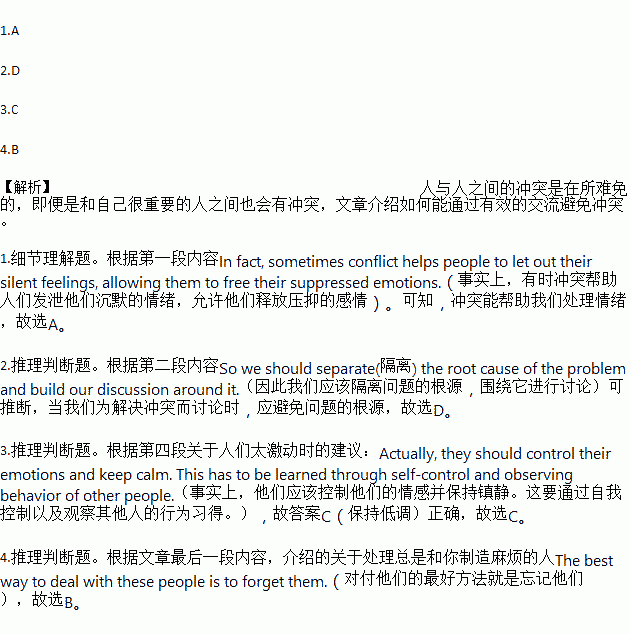题目内容
We can have conflicts with our important persons like friends, relatives, workmates, etc. But the conflicts doesn’t necessarily mean that the relationship will be destroyed. In fact, sometimes conflict helps people to let out their silent feelings, allowing them to free their suppressed emotions. However, when in a conflict, we usually get angry and say or do things which aren’t linked to the problem at hand. Therefore, it is important that we should try to avoid conflicts through effective communication.
In a heated argument, we usually say things that aren’t related to the real problem, and even use rude words to make sure we gain an advantage over the other person. Then the whole situation goes badly. So we should separate(隔离) the root cause of the problem and build our discussion around it. This ensures that there are no rude remarks and the situation moves in a positive direction.
It’s easy for us to think we’re right and if something isn’t working out, it surely must be someone else’s fault. However, if you aim to solve a conflict, first of all, you should show some respect and allow the other party to express themselves. Using remarks like, “I understand your concern on this” or “I know you’re right at your end”, would make the other person feel more appreciated.
Sometimes some people get too excited and may behave in the wrong way or say something others may not appreciate. This can cause a worse situation. Actually, they should control their emotions and keep calm. This has to be learned through self-control and observing behavior of other people.
The tips mentioned above are useful for most situations. However, we don’t rule out the possibility that there are some people always want to create some sort of trouble for others. You can tell them from others, and putting in an effort to resolve a conflict with them may just not be a wise idea. The best way to deal with these people is to forget them. A famous saying can help you and that is: “You should never fight with a pig; you both get dirty and only the pig likes it.”
1.What can we learn from Paragraph 1?
A. Conflicts may help us deal with our emotions.
B. Conflicts can improve our relations with others greatly.
C. Effective communication can help us avoid conflicts undoubtedly.
D. The closer two friends are, the more conflicts are between them.
2.When making discussions to solve conflicts, we should ________.
A. know others’ personal quality
B. know others’ ability of expression
C. avoid showing our disadvantages
D. avoid the root cause of the problem
3.The author suggests that when people get too excited, they should ________.
A. behave like other people B. control the situation
C. learn to keep their head D. say something unconcerned
4.In the author’s opinion, how should you deal with those who always want to create trouble for you?
A. Fight with them. B. Ignore them.
C. Have a talk with them. D. Give them something they like.
 阳光课堂同步练习系列答案
阳光课堂同步练习系列答案

 C. use D. return
C. use D. return